【英语】 高中英语阅读理解(人物故事)试题(有答案和解析)及解析
【英语】高考英语阅读理解(人物故事)题20套(带答案)含解析
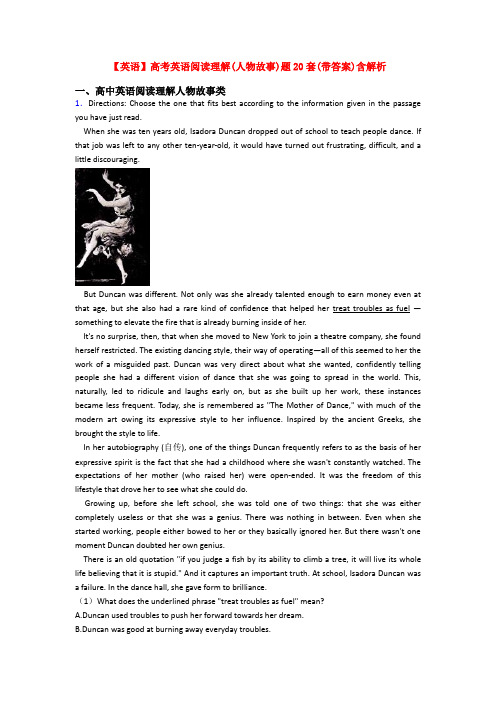
【英语】高考英语阅读理解(人物故事)题20套(带答案)含解析一、高中英语阅读理解人物故事类1.Directions: Choose the one that fits best according to the information given in the passage you have just read.When she was ten years old, Isadora Duncan dropped out of school to teach people dance. If that job was left to any other ten-year-old, it would have turned out frustrating, difficult, and a little discouraging.But Duncan was different. Not only was she already talented enough to earn money even at that age, but she also had a rare kind of confidence that helped her treat troubles as fuel —something to elevate the fire that is already burning inside of her.It's no surprise, then, that when she moved to New York to join a theatre company, she found herself restricted. The existing dancing style, their way of operating—all of this seemed to her the work of a misguided past. Duncan was very direct about what she wanted, confidently telling people she had a different vision of dance that she was going to spread in the world. This, naturally, led to ridicule and laughs early on, but as she built up her work, these instances became less frequent. Today, she is remembered as "The Mother of Dance," with much of the modern art owing its expressive style to her influence. Inspired by the ancient Greeks, she brought the style to life.In her autobiography (自传), one of the things Duncan frequently refers to as the basis of her expressive spirit is the fact that she had a childhood where she wasn't constantly watched. The expectations of her mother (who raised her) were open-ended. It was the freedom of this lifestyle that drove her to see what she could do.Growing up, before she left school, she was told one of two things: that she was either completely useless or that she was a genius. There was nothing in between. Even when she started working, people either bowed to her or they basically ignored her. But there wasn't one moment Duncan doubted her own genius.There is an old quotation "if you judge a fish by its ability to climb a tree, it will live its whole life believing that it is stupid." And it captures an important truth. At school, Isadora Duncan was a failure. In the dance hall, she gave form to brilliance.(1)What does the underlined phrase "treat troubles as fuel" mean?A.Duncan used troubles to push her forward towards her dream.B.Duncan was good at burning away everyday troubles.C.Troubles turned Duncan into a confident girl.D.Troubles lit the fire of dancing in Duncan.(2)Which of the following is TRUE about Duncan?A.Her experience in New York was the foundation of her career.B.Her teaching job when she was little destroyed her confidence.C.Her dancing style was not very well received at the beginning.D.Her mother set higher expectation on her than she could bear.(3)What does the author try to tell the readers in the last paragraph?A.It is useless climbing a tree to catch fish.B.Everybody is a genius in his own way.C.Miseries come from human stupidity.D.Teachers can impact students greatly.(4)What is this passage mainly about?A.Isadora Duncan's childhood and her achievements today.B.Duncan's career development and other dancers' opinions of her.C.Isadora Duncan's early experiences and the reasons for her success.D.Duncan's high status in the dancing world and her unique expressive style.【答案】(1)A(2)C(3)B(4)C【解析】【分析】本文是一篇记叙文,伊莎多拉·邓肯十岁时辍学去教别人跳舞,作者讲述了她的早期的经历以及其取得成功的原因。
英语阅读理解(人物故事)练习题含答案及解析
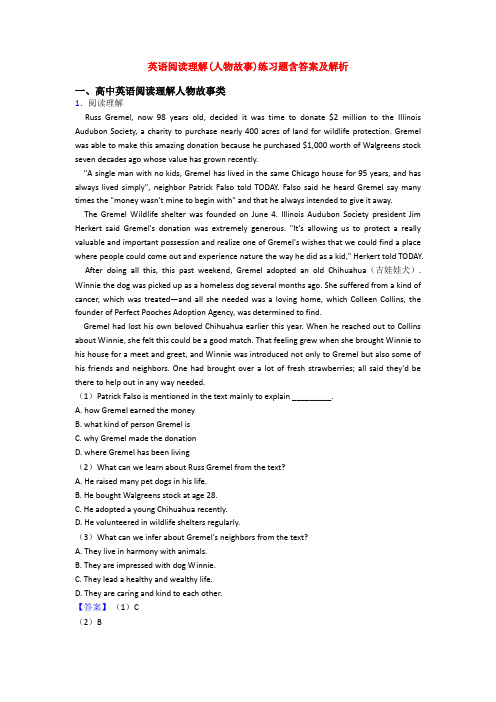
英语阅读理解(人物故事)练习题含答案及解析一、高中英语阅读理解人物故事类1.阅读理解Russ Gremel, now 98 years old, decided it was time to donate $2 million to the Illinois Audubon Society, a charity to purchase nearly 400 acres of land for wildlife protection. Gremel was able to make this amazing donation because he purchased $1,000 worth of Walgreens stock seven decades ago whose value has grown recently."A single man with no kids, Gremel has lived in the same Chicago house for 95 years, and has always lived simply", neighbor Patrick Falso told TODAY. Falso said he heard Gremel say many times the "money wasn't mine to begin with" and that he always intended to give it away.The Gremel Wildlife shelter was founded on June 4. Illinois Audubon Society president Jim Herkert said Gremel's donation was extremely generous. "It's allowing us to protect a really valuable and important possession and realize one of Gremel's wishes that we could find a place where people could come out and experience nature the way he did as a kid," Herkert told TODAY.After doing all this, this past weekend, Gremel adopted an old Chihuahua(吉娃娃犬). Winnie the dog was picked up as a homeless dog several months ago. She suffered from a kind of cancer, which was treated—and all she needed was a loving home, which Colleen Collins, the founder of Perfect Pooches Adoption Agency, was determined to find.Gremel had lost his own beloved Chihuahua earlier this year. When he reached out to Collins about Winnie, she felt this could be a good match. That feeling grew when she brought Winnie to his house for a meet and greet, and Winnie was introduced not only to Gremel but also some of his friends and neighbors. One had brought over a lot of fresh strawberries; all said they'd be there to help out in any way needed.(1)Patrick Falso is mentioned in the text mainly to explain _________.A. how Gremel earned the moneyB. what kind of person Gremel isC. why Gremel made the donationD. where Gremel has been living(2)What can we learn about Russ Gremel from the text?A. He raised many pet dogs in his life.B. He bought Walgreens stock at age 28.C. He adopted a young Chihuahua recently.D. He volunteered in wildlife shelters regularly.(3)What can we infer about Gremel's neighbors from the text?A. They live in harmony with animals.B. They are impressed with dog Winnie.C. They lead a healthy and wealthy life.D. They are caring and kind to each other.【答案】(1)C(2)B(3)D【解析】【分析】本文是一篇记叙文,格雷梅尔是一个没有孩子的单身男人,他在芝加哥同一所房子里住了95年,一直过着简朴的生活。
英语高中阅读理解(人物故事)练习题含解析
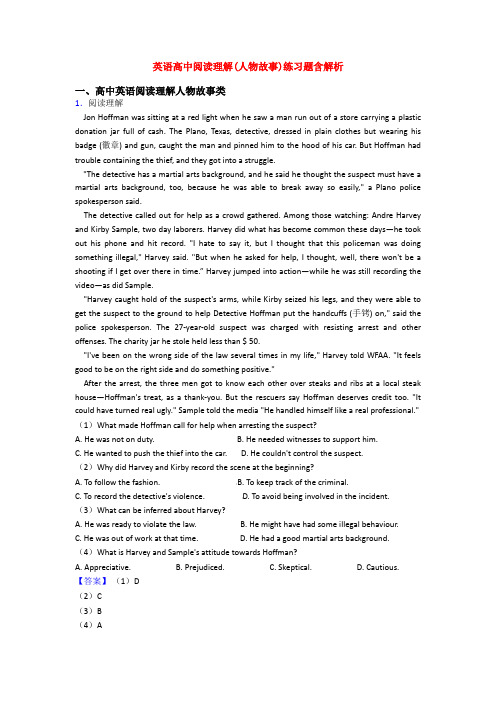
英语高中阅读理解(人物故事)练习题含解析一、高中英语阅读理解人物故事类1.阅读理解Jon Hoffman was sitting at a red light when he saw a man run out of a store carrying a plastic donation jar full of cash. The Plano, Texas, detective, dressed in plain clothes but wearing his badge (徽章) and gun, caught the man and pinned him to the hood of his car. But Hoffman had trouble containing the thief, and they got into a struggle."The detective has a martial arts background, and he said he thought the suspect must have a martial arts background, too, because he was able to break away so easily," a Plano police spokesperson said.The detective called out for help as a crowd gathered. Among those watching: Andre Harvey and Kirby Sample, two day laborers. Harvey did what has become common these days—he took out his phone and hit record. "I hate to say it, but I thought that this policeman was doing something illegal," Harvey said. "But when he asked for help, I thought, well, there won't be a shooting if I get over there in time.” Harvey jumped into action—while he was still recording the video—as did Sample."Harvey caught hold of the suspect's arms, while Kirby seized his legs, and they were able to get the suspect to the ground to help Detective Hoffman put the handcuffs (手铐) on," said the police spokesperson. The 27-year-old suspect was charged with resisting arrest and other offenses. The charity jar he stole held less than $ 50."I've been on the wrong side of the law several times in my life," Harvey told WFAA. "It feels good to be on the right side and do something positive."After the arrest, the three men got to know each other over steaks and ribs at a local steak house—Hoffman's treat, as a thank-you. But the rescuers say Hoffman deserves credit too. "It could have turned real ugly." Sample told the media "He handled himself like a real professional."(1)What made Hoffman call for help when arresting the suspect?A. He was not on duty.B. He needed witnesses to support him.C. He wanted to push the thief into the car.D. He couldn't control the suspect.(2)Why did Harvey and Kirby record the scene at the beginning?A. To follow the fashion.B. To keep track of the criminal.C. To record the detective's violence.D. To avoid being involved in the incident.(3)What can be inferred about Harvey?A. He was ready to violate the law.B. He might have had some illegal behaviour.C. He was out of work at that time.D. He had a good martial arts background.(4)What is Harvey and Sample's attitude towards Hoffman?A. Appreciative.B. Prejudiced.C. Skeptical.D. Cautious.【答案】(1)D(2)C(3)B(4)A【解析】【分析】本文是一篇记叙文,侦探Jon Hoffman在捉偷善款的小偷时遇到困难寻求帮助,Andre Harvey和 Kirby Sample帮助了他。
【英语】高中英语阅读理解(人物故事)解题技巧分析及练习题(含答案)含解析
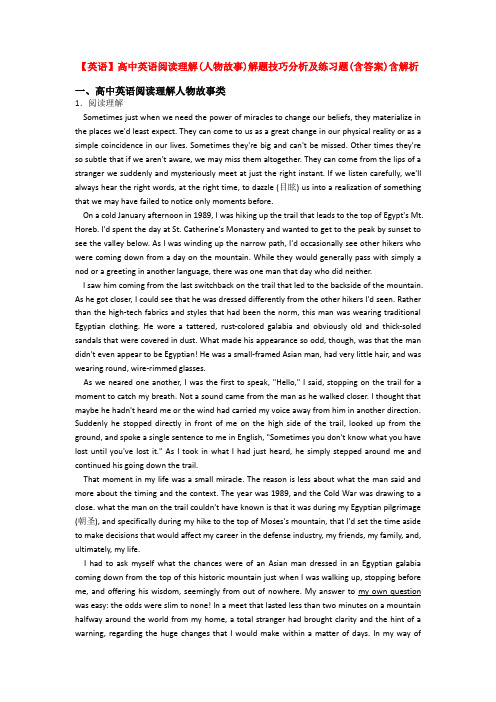
【英语】高中英语阅读理解(人物故事)解题技巧分析及练习题(含答案)含解析一、高中英语阅读理解人物故事类1.阅读理解Sometimes just when we need the power of miracles to change our beliefs, they materialize in the places we'd least expect. They can come to us as a great change in our physical reality or as a simple coincidence in our lives. Sometimes they're big and can't be missed. Other times they're so subtle that if we aren't aware, we may miss them altogether. They can come from the lips of a stranger we suddenly and mysteriously meet at just the right instant. If we listen carefully, we'll always hear the right words, at the right time, to dazzle (目眩) us into a realization of something that we may have failed to notice only moments before.On a cold January afternoon in 1989, I was hiking up the trail that leads to the top of Egypt's Mt. Horeb. I'd spent the day at St. Catherine's Monastery and wanted to get to the peak by sunset to see the valley below. As I was winding up the narrow path, I'd occasionally see other hikers who were coming down from a day on the mountain. While they would generally pass with simply a nod or a greeting in another language, there was one man that day who did neither.I saw him coming from the last switchback on the trail that led to the backside of the mountain. As he got closer, I could see that he was dressed differently from the other hikers I'd seen. Rather than the high-tech fabrics and styles that had been the norm, this man was wearing traditional Egyptian clothing. He wore a tattered, rust-colored galabia and obviously old and thick-soled sandals that were covered in dust. What made his appearance so odd, though, was that the man didn't even appear to be Egyptian! He was a small-framed Asian man, had very little hair, and was wearing round, wire-rimmed glasses.As we neared one another, I was the first to speak, "Hello," I said, stopping on the trail for a moment to catch my breath. Not a sound came from the man as he walked closer. I thought that maybe he hadn't heard me or the wind had carried my voice away from him in another direction. Suddenly he stopped directly in front of me on the high side of the trail, looked up from the ground, and spoke a single sentence to me in English, "Sometimes you don't know what you have lost until you've lost it." As I took in what I had just heard, he simply stepped around me and continued his going down the trail.That moment in my life was a small miracle. The reason is less about what the man said and more about the timing and the context. The year was 1989, and the Cold War was drawing to a close. what the man on the trail couldn't have known is that it was during my Egyptian pilgrimage (朝圣), and specifically during my hike to the top of Moses's mountain, that I'd set the time aside to make decisions that would affect my career in the defense industry, my friends, my family, and, ultimately, my life.I had to ask myself what the chances were of an Asian man dressed in an Egyptian galabia coming down from the top of this historic mountain just when I was walking up, stopping before me, and offering his wisdom, seemingly from out of nowhere. My answer to my own question was easy: the odds were slim to none! In a meet that lasted less than two minutes on a mountain halfway around the world from my home, a total stranger had brought clarity and the hint of a warning, regarding the huge changes that I would make within a matter of days. In my way ofthinking, that's a miracle.I suspect that we all experience small miracles in our lives every day. Sometimes we have the wisdom and the courage to recognize them for what they are In the moments when we don't,that's okay as well. It seems that our miracles have a way of coming back to us again and again.And each time they do, they become a little less subtle, until we can't possibly miss the messagethat they bring to our lives!The key is that they're everywhere and occur every day for different reasons, in response to the different needs that we may have in the moment. Our job may be less about questioning the extraordinary things that happen in our daily lives and more about accepting the gifts they bring.(1)Why did the author make a pilgrimage to Mt Horeb in Egypt?A. He was in search of a miracle in his life.B. It was a holy place for a religious person to head for.C. He intended to make arrangements for his life in the future.D. He waited patiently in expectation of meeting a wise person.(2)What does the underlined part "my own question" refer to in paragraph 6?A. For what reason did the man stop before me?B. Why did the Asian man go to the mountain?C. What change would I make within a matter of days?D. What was the probability that others told us the right words?(3)Which of the following is closest in meaning to the underlined word "subtle" in paragraph 7?A. Apparent.B. Delicate.C. Precise.D. Sufficient.(4)The author viewed the meet with the Asian man as a miracle in his life in that ________.A. the Asian man's appearance had a deciding effect on his future lifeB. his words were in perfect response to the need he had at that momentC. what the Asian man said was abundant in the philosophy of lifeD. the Asian man impressed on him the worth of what he had possessed(5)What might be the best title for the passage?A. Can you recognize a miracle?B. Is a miracle significant to us?C. When might a miracle occur?D. Why do we need a miracle?(6)After the encounter of the Asian man, what will the writer probably do immediately?A. Continue walking up to the top of the mountain.B. Have a rest to refresh himself.C. Try to have a heart-to-heart conversation with the Asian man.D. Come down the mountain.【答案】(1)C(2)D(3)B(4)B(5)A(6)D【解析】【分析】本文是一篇记叙文,作者讲述了一次埃及朝圣时,爬到何烈山半山腰时,偶遇了一位正在下山的亚洲陌生人。
【英语】 英语阅读理解(人物故事)专题练习(及答案)含解析
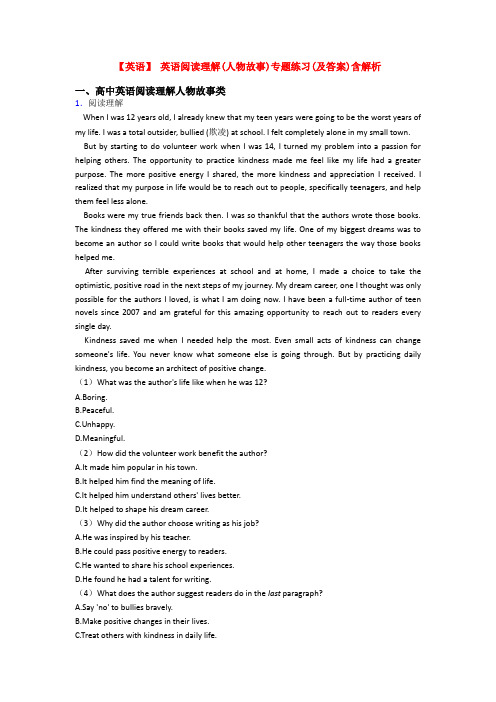
【英语】英语阅读理解(人物故事)专题练习(及答案)含解析一、高中英语阅读理解人物故事类1.阅读理解When I was 12 years old, I already knew that my teen years were going to be the worst years of my life. I was a total outsider, bullied (欺凌) at school. I felt completely alone in my small town.But by starting to do volunteer work when I was 14, I turned my problem into a passion for helping others. The opportunity to practice kindness made me feel like my life had a greater purpose. The more positive energy I shared, the more kindness and appreciation I received. I realized that my purpose in life would be to reach out to people, specifically teenagers, and help them feel less alone.Books were my true friends back then. I was so thankful that the authors wrote those books. The kindness they offered me with their books saved my life. One of my biggest dreams was to become an author so I could write books that would help other teenagers the way those books helped me.After surviving terrible experiences at school and at home, I made a choice to take the optimistic, positive road in the next steps of my journey. My dream career, one I thought was only possible for the authors I loved, is what I am doing now. I have been a full-time author of teen novels since 2007 and am grateful for this amazing opportunity to reach out to readers every single day.Kindness saved me when I needed help the most. Even small acts of kindness can change someone's life. You never know what someone else is going through. But by practicing daily kindness, you become an architect of positive change.(1)What was the author's life like when he was 12?A.Boring.B.Peaceful.C.Unhappy.D.Meaningful.(2)How did the volunteer work benefit the author?A.It made him popular in his town.B.It helped him find the meaning of life.C.It helped him understand others' lives better.D.It helped to shape his dream career.(3)Why did the author choose writing as his job?A.He was inspired by his teacher.B.He could pass positive energy to readers.C.He wanted to share his school experiences.D.He found he had a talent for writing.(4)What does the author suggest readers do in the last paragraph?A.Say 'no' to bullies bravely.B.Make positive changes in their lives.C.Treat others with kindness in daily life.D.Learn to care more about others' feelings.【答案】(1)C(2)B(3)B(4)C【解析】【分析】本文是一篇记叙文,作者讲述了自己参加志愿活动的经历,告诉人们:一次小善举也可能改变一个人的一生。
(英语)高中英语阅读理解(人物故事)解题技巧讲解及练习题(含答案)含解析

(英语)高中英语阅读理解(人物故事)解题技巧讲解及练习题(含答案)含解析一、高中英语阅读理解人物故事类1.阅读理解In the nineteenth century, one of America's greatest writers, Walt Whitman, helped people learn to value poetry. Whitman created a new kind of poetry.Walt Whitman was born in eighteen nineteen in New York City. During his long life, he watched America grow from a young nation to the strongest industrial power in the world. As a young man, Whitman worked as a school teacher, a printer and a newspaper reporter. He was thirty-six years old when he published his first book of poetry in eighteen fifty-five. He called it Leaves of Grass. It had only twelve poems. The poems are written in free verse. The lines do not follow any set form. Some lines are short. Some are long. The words at the end of each line do not have a similar sound. They do not rhyme.One of America's greatest thinkers and writers immediately recognized the importance of Leaves of Grass. Ralph Waldo Emerson praised Whitman's work. But most other poets and writers said nothing and even denounced it. Most readers also rejected Whitman's poems. The new form of his poetry surprised many people. Even his own brother told Whitman that he should stop writing poetry. But Whitman had many things to say. And he continued to say them. Readers began to understand that America had a great new poetic voice.Walt Whitman's poems praise the United States and its democracy. The poet expressed his love for America and its people in many ways. Experts today praise Leaves of Grass as a major literary work. In eighteen seventy-three, Walt Whitman suffered a stroke. He spent the last years of his life in Camden, New Jersey. Whitman was poor and weak during the last years of his life. He died in eighteen ninety-two. Some critics say Walt Whitman was a spokesman for democracy. Others say he was not a spokesman for anything. Instead, they simply call him a great poet.(1)What can we know about Whitman?A. His poems have the same rhyme.B. He is the first great poet in the USAC. He helped people to create new poems.D. His poems show his love for his country.(2)Why was Leaves of Grass refused at first?A. The poems are quite short.B. The form of poetry is special.C. Whitman wasn't famous then.D. There are only 12 poems in it.(3)What does the underlined word "denounced" in Paragraph 3 most probably mean?A. Accused.B. Downloaded.C. Published.D. Translated.(4)What can be a suitable title for the text?A. Walt Whitman—a Great SoldierB. Walt Whitman—an Unfortunate PoetC. Walt Whitman and Leaves of GrassD. The First and Greatest Poet in America【答案】(1)D(2)B(3)A(4)C【解析】【分析】本文是一篇人物介绍,介绍了美国著名的诗人Walt Whitman以及他的代表作《草叶集》。
最新 高中英语阅读理解(人物故事)试题(有答案和解析)及解析
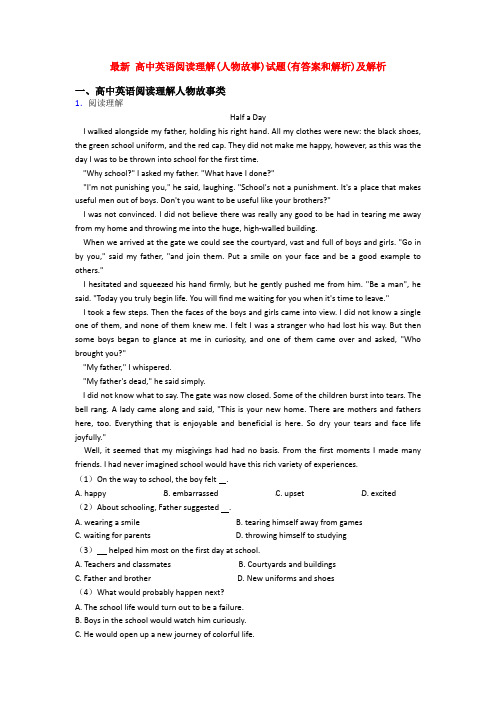
最新高中英语阅读理解(人物故事)试题(有答案和解析)及解析一、高中英语阅读理解人物故事类1.阅读理解Half a DayI walked alongside my father, holding his right hand. All my clothes were new: the black shoes, the green school uniform, and the red cap. They did not make me happy, however, as this was the day I was to be thrown into school for the first time."Why school?" I asked my father. "What have I done?""I'm not punishing you," he said, laughing. "School's not a punishment. It's a place that makes useful men out of boys. Don't you want to be useful like your brothers?"I was not convinced. I did not believe there was really any good to be had in tearing me away from my home and throwing me into the huge, high-walled building.When we arrived at the gate we could see the courtyard, vast and full of boys and girls. "Go in by you," said my father, "and join them. Put a smile on your face and be a good example to others."I hesitated and squeezed his hand firmly, but he gently pushed me from him. "Be a man", he said. "Today you truly begin life. You will find me waiting for you when it's time to leave."I took a few steps. Then the faces of the boys and girls came into view. I did not know a single one of them, and none of them knew me. I felt I was a stranger who had lost his way. But then some boys began to glance at me in curiosity, and one of them came over and asked, "Who brought you?""My father," I whispered."My father's dead," he said simply.I did not know what to say. The gate was now closed. Some of the children burst into tears. The bell rang. A lady came along and said, "This is your new home. There are mothers and fathers here, too. Everything that is enjoyable and beneficial is here. So dry your tears and face life joyfully."Well, it seemed that my misgivings had had no basis. From the first moments I made many friends. I had never imagined school would have this rich variety of experiences.(1)On the way to school, the boy felt .A. happyB. embarrassedC. upsetD. excited(2)About schooling, Father suggested .A. wearing a smileB. tearing himself away from gamesC. waiting for parentsD. throwing himself to studying(3) helped him most on the first day at school.A. Teachers and classmatesB. Courtyards and buildingsC. Father and brotherD. New uniforms and shoes(4)What would probably happen next?A. The school life would turn out to be a failure.B. Boys in the school would watch him curiously.C. He would open up a new journey of colorful life.D. His parents would accompany him at the school.【答案】(1)C(2)A(3)A(4)C【解析】【分析】本文是一篇记叙文,作者第一天去学校的时候并不开心,但是等他到了学校之后,他结交了很多朋友,开始了新的生活。
英语阅读理解(人物故事)专项习题及答案解析及解析
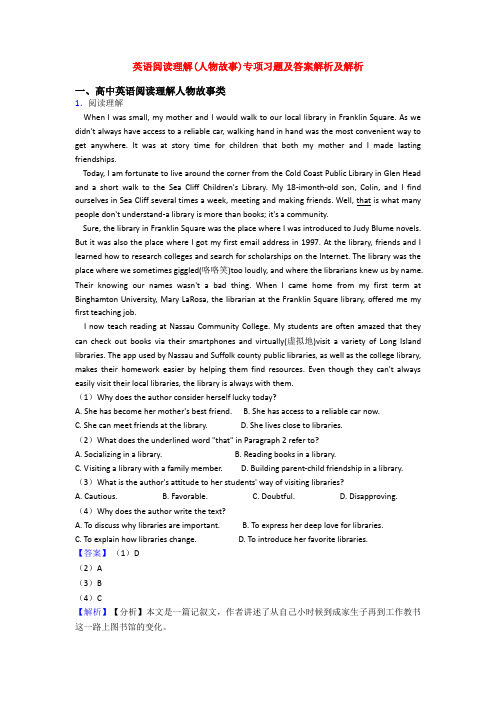
英语阅读理解(人物故事)专项习题及答案解析及解析一、高中英语阅读理解人物故事类1.阅读理解When I was small, my mother and I would walk to our local library in Franklin Square. As we didn't always have access to a reliable car, walking hand in hand was the most convenient way to get anywhere. It was at story time for children that both my mother and I made lasting friendships.Today, I am fortunate to live around the corner from the Cold Coast Public Library in Glen Head and a short walk to the Sea Cliff Children's Library. My 18-imonth-old son, Colin, and I find ourselves in Sea Cliff several times a week, meeting and making friends. Well, that is what many people don't understand-a library is more than books; it's a community.Sure, the library in Franklin Square was the place where I was introduced to Judy Blume novels. But it was also the place where I got my first email address in 1997. At the library, friends and I learned how to research colleges and search for scholarships on the Internet. The library was the place where we sometimes giggled(咯咯笑)too loudly, and where the librarians knew us by name. Their knowing our names wasn't a bad thing. When I came home from my first term at Binghamton University, Mary LaRosa, the librarian at the Franklin Square library, offered me my first teaching job.I now teach reading at Nassau Community College. My students are often amazed that they can check out books via their smartphones and virtually(虚拟地)visit a variety of Long Island libraries. The app used by Nassau and Suffolk county public libraries, as well as the college library, makes their homework easier by helping them find resources. Even though they can't always easily visit their local libraries, the library is always with them.(1)Why does the author consider herself lucky today?A. She has become her mother's best friend.B. She has access to a reliable car now.C. She can meet friends at the library.D. She lives close to libraries.(2)What does the underlined word "that" in Paragraph 2 refer to?A. Socializing in a library.B. Reading books in a library.C. Visiting a library with a family member.D. Building parent-child friendship in a library.(3)What is the author's attitude to her students' way of visiting libraries?A. Cautious.B. Favorable.C. Doubtful.D. Disapproving.(4)Why does the author write the text?A. To discuss why libraries are important.B. To express her deep love for libraries.C. To explain how libraries change.D. To introduce her favorite libraries.【答案】(1)D(2)A(3)B(4)C【解析】【分析】本文是一篇记叙文,作者讲述了从自己小时候到成家生子再到工作教书这一路上图书馆的变化。
(英语) 高中英语阅读理解(人物故事)试题(有答案和解析)及解析
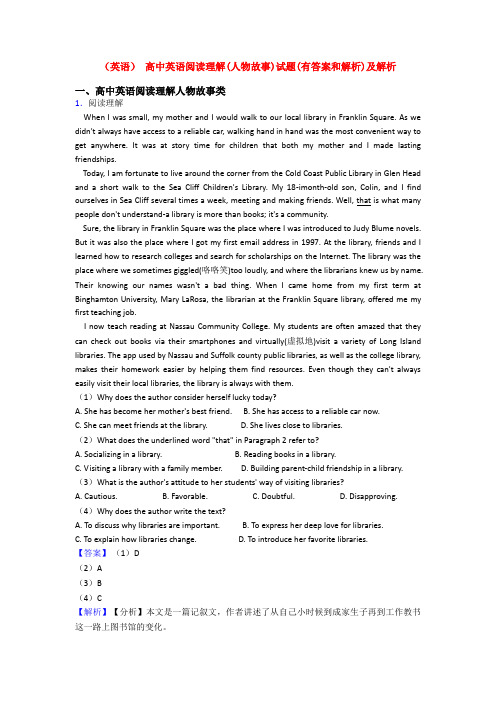
(英语)高中英语阅读理解(人物故事)试题(有答案和解析)及解析一、高中英语阅读理解人物故事类1.阅读理解When I was small, my mother and I would walk to our local library in Franklin Square. As we didn't always have access to a reliable car, walking hand in hand was the most convenient way to get anywhere. It was at story time for children that both my mother and I made lasting friendships.Today, I am fortunate to live around the corner from the Cold Coast Public Library in Glen Head and a short walk to the Sea Cliff Children's Library. My 18-imonth-old son, Colin, and I find ourselves in Sea Cliff several times a week, meeting and making friends. Well, that is what many people don't understand-a library is more than books; it's a community.Sure, the library in Franklin Square was the place where I was introduced to Judy Blume novels. But it was also the place where I got my first email address in 1997. At the library, friends and I learned how to research colleges and search for scholarships on the Internet. The library was the place where we sometimes giggled(咯咯笑)too loudly, and where the librarians knew us by name. Their knowing our names wasn't a bad thing. When I came home from my first term at Binghamton University, Mary LaRosa, the librarian at the Franklin Square library, offered me my first teaching job.I now teach reading at Nassau Community College. My students are often amazed that they can check out books via their smartphones and virtually(虚拟地)visit a variety of Long Island libraries. The app used by Nassau and Suffolk county public libraries, as well as the college library, makes their homework easier by helping them find resources. Even though they can't always easily visit their local libraries, the library is always with them.(1)Why does the author consider herself lucky today?A. She has become her mother's best friend.B. She has access to a reliable car now.C. She can meet friends at the library.D. She lives close to libraries.(2)What does the underlined word "that" in Paragraph 2 refer to?A. Socializing in a library.B. Reading books in a library.C. Visiting a library with a family member.D. Building parent-child friendship in a library.(3)What is the author's attitude to her students' way of visiting libraries?A. Cautious.B. Favorable.C. Doubtful.D. Disapproving.(4)Why does the author write the text?A. To discuss why libraries are important.B. To express her deep love for libraries.C. To explain how libraries change.D. To introduce her favorite libraries.【答案】(1)D(2)A(3)B(4)C【解析】【分析】本文是一篇记叙文,作者讲述了从自己小时候到成家生子再到工作教书这一路上图书馆的变化。
(英语)英语阅读理解(人物故事)练习题及答案及解析

(英语)英语阅读理解(人物故事)练习题及答案及解析一、高中英语阅读理解人物故事类1.阅读理解My family lives in Texas. I was born and brought up in Texas and I am a graduate of the University of Texas. However, around my second year in law school, I wanted to make a great change, which was almost unheard of for Texans: I wanted to leave!I realized this after completing my first year-year internship(实习期) I knew I wanted something different and my chance came during the 2011 Super Bowl in Dallas. A snowstorm blanketed the entire city in snow and thousands of people were gathered. I overheard that StubHub, a big company from a great city, San Francisco, was throwing a party next door to my hotel. I thought if l could get an internship, I could leave for the summer and at least see what it was like. Yes, it was a huge leap. I told myself I was ready.There was just one problem: I wasn't invited to the StubHub party. But you know I'm the type of person who goes for something she wants. Needless to say, I crashed the party and found my way to the president. I kindly introduced myself and then asked if they had a legal internship program. Guess what? They accepted my request to be a legal intern, even though no such program existed.Although the legal department didn't have a permanent position for me, the experience has shaped my life. Working for a great company in San Francisco, I'm incredibly happy for making my decision to leave Texas.By leaving Texas, I learned that it is so much more rewarding to try the unfamiliar than to stay in the comfortable. Exploring the unfamiliar is how you'll understand what fits your life. I say, dive in head first.(1)The author went to Dallas to in 2011.A. watch the Super BowlB. meet up with her familyC. flee San FranciscoD. hunt for an internship(2)Which is the biggest lesson that the author learned from the experience?A. You must choose a career that you like.B. Jumping out of your comfort zone is rewarding.C. Accepting who you are makes you realize your strengths.D. You should listen to your family to learn about your potential.(3)Which of the following words best describe the author?A. Patient and modest.B. Supportive and energetic.C. Intelligent and humorous.D. Determined and adventurous.【答案】(1)D(2)B(3)D【解析】【分析】本文是一篇记叙文,作者去达拉斯寻找实习机会,并从中学到了很多。
(英语)高考英语阅读理解(人物故事)题20套(带答案)及解析

(英语)高考英语阅读理解(人物故事)题20套(带答案)及解析一、高中英语阅读理解人物故事类1.阅读理解Three months after Hurricane Katrina in 2005, Rebecca Sell, then 24, a photojournalist for Fredericksburg photographed a New Orleans couple worriedly examining water-spotted photo albums. As she took the photo, something within her clicked. "I told them I could take the ruined pictures, copy them and give them digitally restored (修复) photos," she recalls. Although a bit sceptical, the couple agreed. Rebecca took their photos home, restored them and took them to the couple at their temporary home. "It felt so good to be able to do that for them," says Rebecca. When her editor, Dave Ellis, saw the photo of the couple, he suggested they go back and restore damaged photos for even more people. So in January 2006, with paid time off from the paper, the two set up shop in Pass Christian. After posting a notice in the community newsletter, Rebecca and Dave received 500 photos in four days. For each, the pair took a new digital picture, then used high-tech software to erase water spots and restore colors. It just so happened that a popular website linked to Dave's blog about the experience, and soon Operation Photo Rescue, as it came to be known, had emails from hundreds of volunteers, including photographers and restoration experts, eager to help.Though digital restoration is a painstaking process, mending irreplaceable family pictures means the world to victims like Emily Lancaster, 71, who took out piles of ruined photo albums after Katrina, never thinking the mess could be saved. But she just couldn't bear to part with a few treasured pictures, including a portrait of her father, who had passed away, and a photo of her husband as a boy. Then she heard about Operation Photo Rescue. "I didn't have a whole lot of hope they could fix them, but they did," Emily says. "Almost every day I think about all the pictures I've lost. I'm so happy to have these two."In the five years since Katrina, Operation Photo Rescue has collected thousands of pictures ruined by floods, hurricanes and tornadoes. Volunteers make "copy runs" to disaster areas across the country to gather damaged photos from survivors; operating costs are covered by donations. "It's great to be able to give people some of their history back," says Rebecca. "One person told me that thanks to us, her grandmother got to see her photos again before she passed away. Moments like that remind me why I do this."(1)When Rebecca took the picture of the New Orleans couple, she decided to .A. take them to their temporary homeB. help with their damaged photosC. set up shop in Pass ChristianD. cover Hurricane Katrina(2)From Paragraph 2, we know that Dave and Rebecca .A. quit their jobs in 2006B. inspired volunteers to join themC. spent four days mending the photosD. made their work known in their newspaper (3)How did Emily Lancaster feel when she first heard about Operation Photo Rescue? A. Excited. B. Hopeless. C. Satisfied. D. Sceptical.(4)What is the best title for the passage?A. Surviving HurricanesB. An Act of GenerosityC. Saving MemoriesD. A Lucky Couple【答案】(1)B(2)B(3)D(4)C【解析】【分析】本文是一篇记叙文,摄影记者丽贝卡塞尔和编辑戴夫·埃利斯通过照片修复,他们让很多人丢失的记忆得到恢复,同时,也赢得了人们的肯定。
高中英语阅读理解(人物故事)试题(有答案和解析)及解析

高中英语阅读理解(人物故事)试题(有答案和解析)及解析一、高中英语阅读理解人物故事类1.阅读理解Arthur Dubois isn't your typical grandfather. That's because at 72 years old, the Chicago resident is a newly discovered hip-hop artist.This week, Dubois walked into Haven Studios, a music program on the South Side of Chicago that supports young ambitious artists. The owner of Haven Studios, Andre "Add-2" Daniels, said Dubois claimed he was "young at heart." So, Daniels decided to listen to Dubois' music. He was completely floored. Daniels quickly took videos showcasing Dubois' talents and posted them to Twitter. His tweet went viral, receiving thousands of reactions within a matter of days. Now, Dubois' talents have even caught the attention of some famous hip-hop producers."It's not what you would expect, right?" Daniels says in one of the videos. Dubois music is playing in the background, giving a steady beat that easily invites listeners to dance.Dubois said his style was entirely self-taught. He first started teaching himself to produce hip-hop beats about six years ago, after he retired. "I found something to do," he told NPR's Scott Simon. "I had to learn how to do the computer and music at the same time." Dubois taught himself by using the audio editing software. Now he's learning another new skill-social media. Dubois' newfound social media fame has been a little overwhelming for him. "I was shocked," he said. "I broke down and cried because I didn't know that many people liked me." Daniels has helped Dubois set up accounts on Twitter and Instagram for his fans to follow, "I'd never used Instargram, Twitter and all that other stuff," Dubois said. "Because I didn't believe in that stuff myself. But now I've got to have it." The attention doesn't seem to have gone to Dubois' head though-he doesn't really care about getting famous or making money. "I just want to put it out there and let other people hear my music."(1)What does the underlined word "floored" in Paragraph 2 mean?A. Astonished.B. Scared.C. Nervous.D. Hurt.(2)Who helped Dubois take up hip-hop?A. Daniels.B. He himself.C. NPR's Scott Simon.D. Hip-hop producers.(3)What can we infer from the text?A. Daniels set up accounts for Dubois.B. Daniels didn't enjoy Dubois' music at first.C. Dubois seeks for personal fame and wealth.D. Dubois didn't expect his popularity on the Internet.(4)What can we conclude from the passage?A. Well begun in half done.B. It's never too late to learn.C. Lost time in never found again.D. One good turn deserves another.【答案】(1)A(2)B(3)D(4)B【解析】【分析】本文是一篇记叙文,72岁的爷爷Dubois自学嘻哈音乐,并在网上拥有大量的粉丝。
高中英语阅读理解(人物故事)试题(有答案和解析)
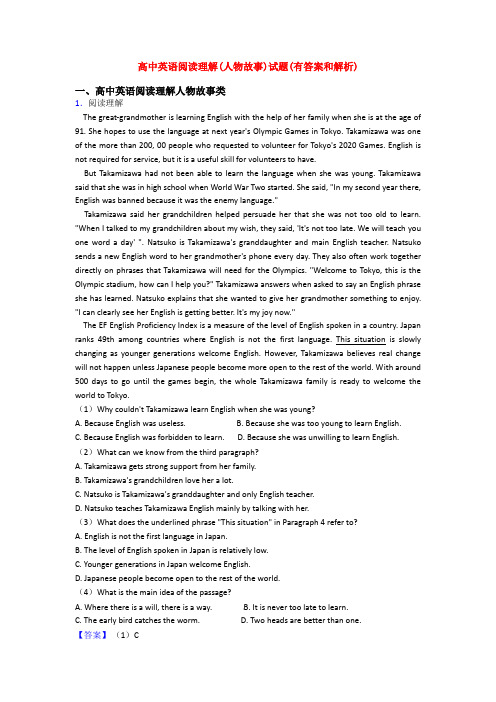
高中英语阅读理解(人物故事)试题(有答案和解析)一、高中英语阅读理解人物故事类1.阅读理解The great-grandmother is learning English with the help of her family when she is at the age of 91. She hopes to use the language at next year's Olympic Games in Tokyo. Takamizawa was one of the more than 200, 00 people who requested to volunteer for Tokyo's 2020 Games. English is not required for service, but it is a useful skill for volunteers to have.But Takamizawa had not been able to learn the language when she was young. Takamizawa said that she was in high school when World War Two started. She said, "In my second year there, English was banned because it was the enemy language."Takamizawa said her grandchildren helped persuade her that she was not too old to learn. "When I talked to my grandchildren about my wish, they said, 'It's not too late. We will teach you one word a day' ". Natsuko is Takamizawa's granddaughter and main English teacher. Natsuko sends a new English word to her grandmother's phone every day. They also often work together directly on phrases that Takamizawa will need for the Olympics. "Welcome to Tokyo, this is the Olympic stadium, how can I help you?" Takamizawa answers when asked to say an English phrase she has learned. Natsuko explains that she wanted to give her grandmother something to enjoy. "I can clearly see her English is getting better. It's my joy now."The EF English Proficiency Index is a measure of the level of English spoken in a country. Japan ranks 49th among countries where English is not the first language. This situation is slowly changing as younger generations welcome English. However, Takamizawa believes real change will not happen unless Japanese people become more open to the rest of the world. With around 500 days to go until the games begin, the whole Takamizawa family is ready to welcome the world to Tokyo.(1)Why couldn't Takamizawa learn English when she was young?A. Because English was useless.B. Because she was too young to learn English.C. Because English was forbidden to learn.D. Because she was unwilling to learn English.(2)What can we know from the third paragraph?A. Takamizawa gets strong support from her family.B. Takamizawa's grandchildren love her a lot.C. Natsuko is Takamizawa's granddaughter and only English teacher.D. Natsuko teaches Takamizawa English mainly by talking with her.(3)What does the underlined phrase "This situation" in Paragraph 4 refer to?A. English is not the first language in Japan.B. The level of English spoken in Japan is relatively low.C. Younger generations in Japan welcome English.D. Japanese people become open to the rest of the world.(4)What is the main idea of the passage?A. Where there is a will, there is a way.B. It is never too late to learn.C. The early bird catches the worm.D. Two heads are better than one.【答案】(1)C(2)A(3)B(4)B【解析】【分析】本文是一篇记叙文,日本91岁的奶奶Takamizawa为了做好迎接在东京举行的2020奥运会的志愿工作,在孙辈的鼓励和帮助下开始学习英语。
(英语)英语阅读理解(人物故事)题20套(带答案)含解析

(英语)英语阅读理解(人物故事)题20套(带答案)含解析一、高中英语阅读理解人物故事类1.阅读理解A photography exhibition by French artist San Bartolome entitled Moon Door Dreamers opened in the 798 Art Zone in Beijing on December 10, 2011, presenting a cross-cultural perspective (视角) on ordinary life in the capital city.Bartolome took these photos in August 2008, and produced a video named Two Worlds, One Dream. These works were displayed in Pingyao, an ancient city in Shanxi Province, under the title Beijing Midsummer Night Dream in September 2010.The moon doors serve as a keyhole through which one can catch a glimpse of a slice of Beijing life. He got his inspiration from one cycling trip to the southeastern suburb of Beijing, where he discovered a peculiar street along which a gray brick wall was built to cover the shabby bungalows. These cabins were mostly rented by migrant workers- peddlers, craftsmen, grocers and innkeepers.Born in 1950, Bartolome has worked as a photographer, stage director. Artistic manager, writer and diplomat. A noted Sinophile, Bartolome frequently visits China for photographic subjects. In the fall of 2003, he joined the French Embassy in Beijing as a cultural attache. His work experience in China from 2003 to 2015 further enhanced his awareness of and love for China.Bartolome not only loves Chinese culture but also the Chinese people. He thinks that Chinese people are kind, welcoming and diverse.Back from his bike ride to southeastern Beijing, he decided to shoot pictures about ordinary urban lifestyles. He observed dwellers carefully and made friends with them.After about 30 days and nights that he spent with these common migrants, he created a number of portraits. Meanwhile, he learned more about those rural migrants who earn their living in a city with which they are unfamiliar.He adopted an optimistic perspective to shoot the sights, and he borrowed the title of one of William Shakespeare s comedy works: A Midsummer Night's Dream.(1)What is the main purpose of the exhibition?A. To present Bartolome's photographic skills.B. To tell us Bartolome's work experience in Beijing.C. To show us Bartolome's optimistic view on ordinary life in Beijing.D. To build a cross-cultural communication bridge between China and France.(2)What inspires Bartolome to shoot pictures about ordinary urban styles?A. His bike ride to Southeastern suburb of Beijing.B. His work experience in the French Embassy in Beijing.C. His visit to the ancient city of Pingyao.D. Shakespeare's comedy work: A Midsummer Night's Dream.(3)What does the underlined word "Sinaphile" in paragraph 4 refer to?A. A successful artist.B. A cultural attache.C. A person of status.D. A fan of China.(4)What does the text mainly talk about?A. A French artist tells Chinese stories with his camera.B. A French artist frequently visits China for photography.C. Migrant workers live a simple but happy life in Beijing.D. Moon Doors serve as a window to display China to the world.【答案】(1)C(2)A(3)D(4)A【解析】【分析】本文是一篇记叙文,法国艺术家圣巴托洛姆在北京798艺术区举办的名为"月亮之门梦想家"的摄影展,从跨文化角度呈现了普通城市的生活以及拍摄的原因。
高中英语阅读理解(人物故事)试题(有答案和解析)含解析
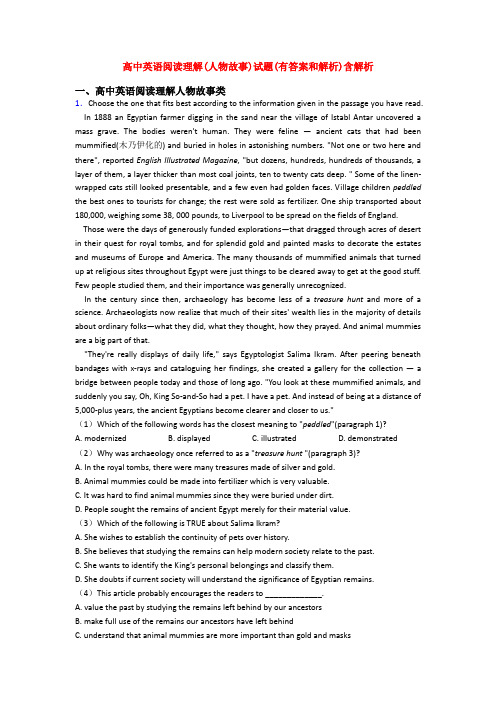
高中英语阅读理解(人物故事)试题(有答案和解析)含解析一、高中英语阅读理解人物故事类1.Choose the one that fits best according to the information given in the passage you have read. In 1888 an Egyptian farmer digging in the sand near the village of Istabl Antar uncovered a mass grave. The bodies weren't human. They were feline —ancient cats that had been mummified(木乃伊化的) and buried in holes in astonishing numbers. "Not one or two here and there", reported English Illustrated Magazine, "but dozens, hundreds, hundreds of thousands, a layer of them, a layer thicker than most coal joints, ten to twenty cats deep. " Some of the linen-wrapped cats still looked presentable, and a few even had golden faces. Village children peddled the best ones to tourists for change; the rest were sold as fertilizer. One ship transported about 180,000, weighing some 38, 000 pounds, to Liverpool to be spread on the fields of England.Those were the days of generously funded explorations—that dragged through acres of desert in their quest for royal tombs, and for splendid gold and painted masks to decorate the estates and museums of Europe and America. The many thousands of mummified animals that turned up at religious sites throughout Egypt were just things to be cleared away to get at the good stuff. Few people studied them, and their importance was generally unrecognized.In the century since then, archaeology has become less of a treasure hunt and more of a science. Archaeologists now realize that much of their sites' wealth lies in the majority of details about ordinary folks—what they did, what they thought, how they prayed. And animal mummies are a big part of that."They're really displays of daily life," says Egyptologist Salima Ikram. After peering beneath bandages with x-rays and cataloguing her findings, she created a gallery for the collection — a bridge between people today and those of long ago. "You look at these mummified animals, and suddenly you say, Oh, King So-and-So had a pet. I have a pet. And instead of being at a distance of 5,000-plus years, the ancient Egyptians become clearer and closer to us."(1)Which of the following words has the closest meaning to "peddled"(paragraph 1)? A. modernized B. displayed C. illustrated D. demonstrated(2)Why was archaeology once referred to as a "treasure hunt "(paragraph 3)?A. In the royal tombs, there were many treasures made of silver and gold.B. Animal mummies could be made into fertilizer which is very valuable.C. It was hard to find animal mummies since they were buried under dirt.D. People sought the remains of ancient Egypt merely for their material value.(3)Which of the following is TRUE about Salima Ikram?A. She wishes to establish the continuity of pets over history.B. She believes that studying the remains can help modern society relate to the past.C. She wants to identify the King's personal belongings and classify them.D. She doubts if current society will understand the significance of Egyptian remains.(4)This article probably encourages the readers to _____________.A. value the past by studying the remains left behind by our ancestorsB. make full use of the remains our ancestors have left behindC. understand that animal mummies are more important than gold and masksD. become more sensitive to the ancient lifestyle of our ancestors【答案】(1)B(2)D(3)B(4)A【解析】【分析】本文是一篇记叙文,自从1888年在埃及发现了猫动物的木乃伊之后,大量的皇家墓穴被挖掘,成千上万的木乃伊被运往世界各地,以攫取物质利益。
【英语】高考英语阅读理解(人物故事)题20套(带答案)及解析

【英语】高考英语阅读理解(人物故事)题20套(带答案)及解析一、高中英语阅读理解人物故事类1 •阅读理解Even if you've never been to Phoenix, you know this about the place It's hot. From June to September, the temperature can easily surpass the cen tury mark. But that does n't stop hikers from attempt ing the 1.3-mile hiki ng to the top of the city's famed Camelback Mountain. Sig ns warn that the trail is "extremely difficult". If you continue, a posted checklist suggests at least a liter of water per person. And if you're still not stopped, another sign farther up declares: "If you're halfway through your water, tur n around!"Unfortun ately, many people to not take the warnings seriously. Fortun ate y, Scott Cullymore does. The 53-year-old Cullymore can be found hiking up and down Camelback a couple of times a day, givi ng out cold bottles of water to worn-out hikers. He has helped hydrate so many hikers that he has earned a heave nly nickn ame: the Water An gel.Cullymore was on Camelback Mountain one day in 2015 when a British tourist died after being lost for n early six hours in the July heat. That experie nce in spired him to start help ing people caught un aware by the cruelty of Mother Nature. "They un derestimate the mountain, and they overestimate what they can do, and they get themselves in trouble." he warned.One hiker who was offered water agrees. "You think you know the heat, but the n you get out here in the desert and it surrounds you like a blanket," said Austin Hill, who was hiking with a high school friend. They were lucky, he said pointing to Cullymore. "We ran into this Good Samarita n here." And with that, the Water An gel goes in search of ano ther hiker in n eed.(1)What is the first paragraph mainly about?A. The risks in volved in the hik ing.B. The serious ness of the warnin gs.C. The distributio n of sig ns that warn hikers.D. The in flue nce of the temperature on hikers.(2)Why did some hikers on Camelback Mountain get in trouble?A. They were not well trained in hik ing.B. They forgot to take eno ugh water with them.C. They were too optimistic about the situati on.D. They were not fit eno ugh to hike the mountain.(3)What can we know about Austin Hill?A. He agreed to help others.B. He was saved by Cullymore.C. He hiked alone in the desert.D. He regretted tak ing a bla nket.(4)What is the best title for the text?A. The Camelback Moun ta inB. Survivi ng the HeatC. Hikers in NeedD. The Water An gel【答案】(1) A(2) C(3) B(4) D【解析】【分析】本文是一篇记叙文,远足者低估夏日的Camelback Mountain 同时高估自己的能力,所以在远足途中遇到麻烦,Cullymore 了解情况后决定帮助他们。
高一英语阅读理解(人物故事)试题(有答案和解析)
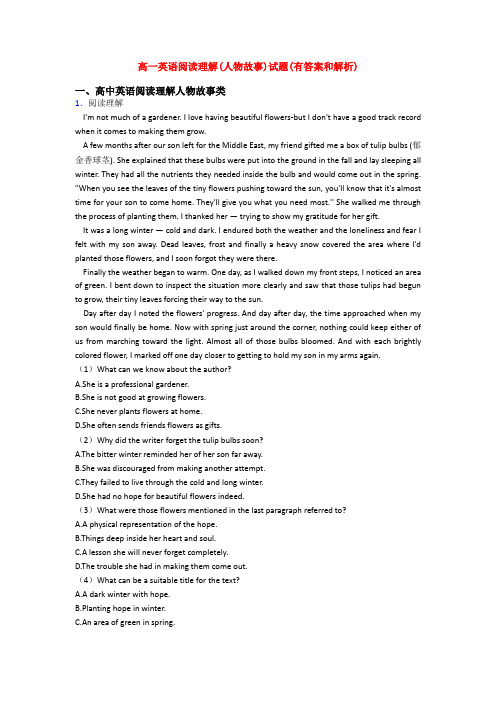
高一英语阅读理解(人物故事)试题(有答案和解析)一、高中英语阅读理解人物故事类1.阅读理解I'm not much of a gardener. I love having beautiful flowers-but I don't have a good track record when it comes to making them grow.A few months after our son left for the Middle East, my friend gifted me a box of tulip bulbs (郁金香球茎). She explained that these bulbs were put into the ground in the fall and lay sleeping all winter. They had all the nutrients they needed inside the bulb and would come out in the spring. ''When you see the leaves of the tiny flowers pushing toward the sun, you'll know that it's almost time for your son to come home. They'll give you what you need most.'' She walked me through the process of planting them. I thanked her — trying to show my gratitude for her gift.It was a long winter — cold and dark. I endured both the weather and the loneliness and fear I felt with my son away. Dead leaves, frost and finally a heavy snow covered the area where I'd planted those flowers, and I soon forgot they were there.Finally the weather began to warm. One day, as I walked down my front steps, I noticed an area of green. I bent down to inspect the situation more clearly and saw that those tulips had begun to grow, their tiny leaves forcing their way to the sun.Day after day I noted the flowers' progress. And day after day, the time approached when my son would finally be home. Now with spring just around the corner, nothing could keep either of us from marching toward the light. Almost all of those bulbs bloomed. And with each brightly colored flower, I marked off one day closer to getting to hold my son in my arms again.(1)What can we know about the author?A.She is a professional gardener.B.She is not good at growing flowers.C.She never plants flowers at home.D.She often sends friends flowers as gifts.(2)Why did the writer forget the tulip bulbs soon?A.The bitter winter reminded her of her son far away.B.She was discouraged from making another attempt.C.They failed to live through the cold and long winter.D.She had no hope for beautiful flowers indeed.(3)What were those flowers mentioned in the last paragraph referred to?A.A physical representation of the hope.B.Things deep inside her heart and soul.C.A lesson she will never forget completely.D.The trouble she had in making them come out.(4)What can be a suitable title for the text?A.A dark winter with hope.B.Planting hope in winter.C.An area of green in spring.D.Living a changeable life.【答案】(1)B(2)D(3)A(4)B【解析】【分析】本文是一篇记叙文,作者的儿子去了中东,作者感到孤独和寂寞。
【英语】英语阅读理解(人物故事)专项习题及答案解析
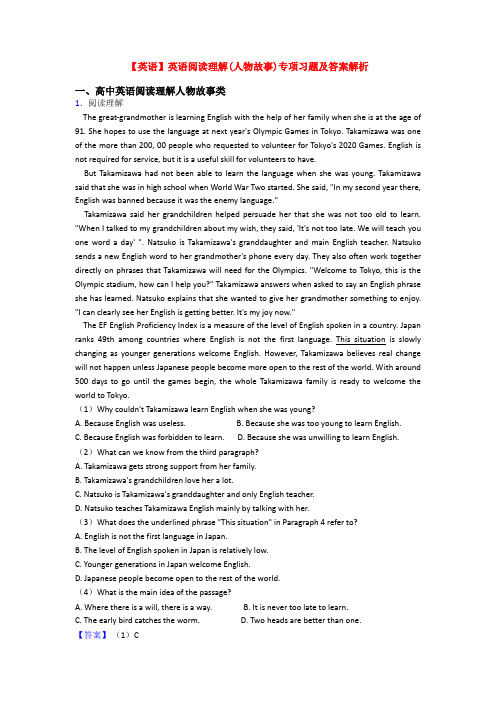
【英语】英语阅读理解(人物故事)专项习题及答案解析一、高中英语阅读理解人物故事类1.阅读理解The great-grandmother is learning English with the help of her family when she is at the age of 91. She hopes to use the language at next year's Olympic Games in Tokyo. Takamizawa was one of the more than 200, 00 people who requested to volunteer for Tokyo's 2020 Games. English is not required for service, but it is a useful skill for volunteers to have.But Takamizawa had not been able to learn the language when she was young. Takamizawa said that she was in high school when World War Two started. She said, "In my second year there, English was banned because it was the enemy language."Takamizawa said her grandchildren helped persuade her that she was not too old to learn. "When I talked to my grandchildren about my wish, they said, 'It's not too late. We will teach you one word a day' ". Natsuko is Takamizawa's granddaughter and main English teacher. Natsuko sends a new English word to her grandmother's phone every day. They also often work together directly on phrases that Takamizawa will need for the Olympics. "Welcome to Tokyo, this is the Olympic stadium, how can I help you?" Takamizawa answers when asked to say an English phrase she has learned. Natsuko explains that she wanted to give her grandmother something to enjoy. "I can clearly see her English is getting better. It's my joy now."The EF English Proficiency Index is a measure of the level of English spoken in a country. Japan ranks 49th among countries where English is not the first language. This situation is slowly changing as younger generations welcome English. However, Takamizawa believes real change will not happen unless Japanese people become more open to the rest of the world. With around 500 days to go until the games begin, the whole Takamizawa family is ready to welcome the world to Tokyo.(1)Why couldn't Takamizawa learn English when she was young?A. Because English was useless.B. Because she was too young to learn English.C. Because English was forbidden to learn.D. Because she was unwilling to learn English.(2)What can we know from the third paragraph?A. Takamizawa gets strong support from her family.B. Takamizawa's grandchildren love her a lot.C. Natsuko is Takamizawa's granddaughter and only English teacher.D. Natsuko teaches Takamizawa English mainly by talking with her.(3)What does the underlined phrase "This situation" in Paragraph 4 refer to?A. English is not the first language in Japan.B. The level of English spoken in Japan is relatively low.C. Younger generations in Japan welcome English.D. Japanese people become open to the rest of the world.(4)What is the main idea of the passage?A. Where there is a will, there is a way.B. It is never too late to learn.C. The early bird catches the worm.D. Two heads are better than one.【答案】(1)C(2)A(3)B(4)B【解析】【分析】本文是一篇记叙文,日本91岁的奶奶Takamizawa为了做好迎接在东京举行的2020奥运会的志愿工作,在孙辈的鼓励和帮助下开始学习英语。
【英语】阅读理解(人物故事)练习题含答案及解析

【英语】阅读理解(人物故事)练习题含答案及解析一、高中英语阅读理解人物故事类1.阅读理解Imagine someone who has spent the majority of their life sitting with a sign on the side of the road and that very person giving someone their last 20 dollars. That's exactly what Marine Corps veteran (退伍军人) Johnny Bobbitt, 34, did in October in Philadelphia.Bobbitt served in the U.S. Marine Corps and worked as a paramedic (医务辅助人员) in Vance County, N. C. before he became homeless. Nobody knew how he got to where he was because he was discreet about that.One night in October, Bobbitt was sitting roadside with a sign in Philadelphia as usual, when Kate McClure of Florence Township, N. J. was driving home down Interstate 95 and ran out of gas. Scared and nervous, she got out of the car to head to the nearest gas station. As McClure was heading to the nearest gas station, she ran into Bobbitt and he told her to get back in the vehicle and lock the door. Minutes later, he appeared with a red gas can. He'd used his last $20 to buy her gas.After that unexpected meeting, McClure and her boyfriend, Mark D'Amico, who both live in New Jersey, visited Bobbitt several times to deliver gift cards, cash, snacks and toiletries. They then decided to create a fund raising page so he wouldn't have to spend the holidays sleeping on the street.McClure started the GoFundMe page on November 10. With the page, the couple hoped to raise $10,000, enough money for his rent, a reliable vehicle and up to six months' expenses. Bobbitt's story ran in a local paper. By November 15,more than 10,000 local people had made donations through the GoFundMe page and more than $300,000 had been raised.On Thanksgiving, Bobbitt was resting in a hotel, his feet up on the bed, drawing up a grand plan for his new life, thanks to several thousand dollars raised to repay him for a good deed.(1)What does the underlined word "discreet" in paragraph 2 most probably mean?A. Doubtful.B. Cautious.C. Guilty.D. Optimistic.(2)McClure met Bobbitt when she .A. couldn't find a gas stationB. got to the way homeC. couldn't unlock her carD. was in search of gas(3)It can be known from the text that .A. Bobbitt's story obtained wide attentionB. Bobbitt became world-famous overnightC. the GoFundMe page collected over $400,000 for BobbittD. the GoFundMe page was started to help people like Bobbitt(4)What is the best title for the text?A. A Homeless Veteran Paid Kindness ForwardB. A Homeless Veteran Had a Generous HeartC. A Homeless Veteran's Kindness Paid OffD. A Small Kindness Made a Big Difference【答案】(1)B(2)D(3)A(4)C【解析】【分析】本文是一篇记叙文,—个无家可归的退伍军人将身上仅有的二十美元买了汽油送给在回家途中汽车没油的年轻女子,事后这名女子和她的男朋友专门建了一个网页为他募捐,使他不用再睡在大街上。
(英语)高二英语阅读理解(人物故事)题20套(带答案)含解析
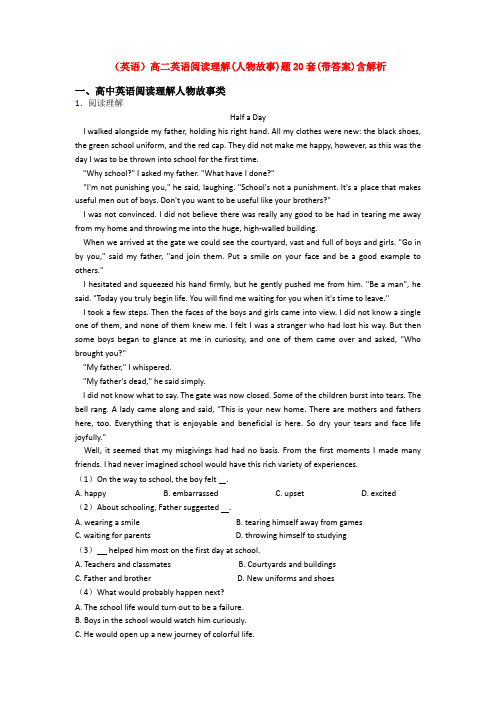
(英语)高二英语阅读理解(人物故事)题20套(带答案)含解析一、高中英语阅读理解人物故事类1.阅读理解Half a DayI walked alongside my father, holding his right hand. All my clothes were new: the black shoes, the green school uniform, and the red cap. They did not make me happy, however, as this was the day I was to be thrown into school for the first time."Why school?" I asked my father. "What have I done?""I'm not punishing you," he said, laughing. "School's not a punishment. It's a place that makes useful men out of boys. Don't you want to be useful like your brothers?"I was not convinced. I did not believe there was really any good to be had in tearing me away from my home and throwing me into the huge, high-walled building.When we arrived at the gate we could see the courtyard, vast and full of boys and girls. "Go in by you," said my father, "and join them. Put a smile on your face and be a good example to others."I hesitated and squeezed his hand firmly, but he gently pushed me from him. "Be a man", he said. "Today you truly begin life. You will find me waiting for you when it's time to leave."I took a few steps. Then the faces of the boys and girls came into view. I did not know a single one of them, and none of them knew me. I felt I was a stranger who had lost his way. But then some boys began to glance at me in curiosity, and one of them came over and asked, "Who brought you?""My father," I whispered."My father's dead," he said simply.I did not know what to say. The gate was now closed. Some of the children burst into tears. The bell rang. A lady came along and said, "This is your new home. There are mothers and fathers here, too. Everything that is enjoyable and beneficial is here. So dry your tears and face life joyfully."Well, it seemed that my misgivings had had no basis. From the first moments I made many friends. I had never imagined school would have this rich variety of experiences.(1)On the way to school, the boy felt .A. happyB. embarrassedC. upsetD. excited(2)About schooling, Father suggested .A. wearing a smileB. tearing himself away from gamesC. waiting for parentsD. throwing himself to studying(3) helped him most on the first day at school.A. Teachers and classmatesB. Courtyards and buildingsC. Father and brotherD. New uniforms and shoes(4)What would probably happen next?A. The school life would turn out to be a failure.B. Boys in the school would watch him curiously.C. He would open up a new journey of colorful life.D. His parents would accompany him at the school.【答案】(1)C(2)A(3)A(4)C【解析】【分析】本文是一篇记叙文,作者第一天去学校的时候并不开心,但是等他到了学校之后,他结交了很多朋友,开始了新的生活。
- 1、下载文档前请自行甄别文档内容的完整性,平台不提供额外的编辑、内容补充、找答案等附加服务。
- 2、"仅部分预览"的文档,不可在线预览部分如存在完整性等问题,可反馈申请退款(可完整预览的文档不适用该条件!)。
- 3、如文档侵犯您的权益,请联系客服反馈,我们会尽快为您处理(人工客服工作时间:9:00-18:30)。
【英语】高中英语阅读理解(人物故事)试题(有答案和解析)及解析一、高中英语阅读理解人物故事类1.阅读理解When I was 12 years old, I already knew that my teen years were going to be the worst years of my life. I was a total outsider, bullied (欺凌) at school. I felt completely alone in my small town.But by starting to do volunteer work when I was 14, I turned my problem into a passion for helping others. The opportunity to practice kindness made me feel like my life had a greater purpose. The more positive energy I shared, the more kindness and appreciation I received. I realized that my purpose in life would be to reach out to people, specifically teenagers, and help them feel less alone.Books were my true friends back then. I was so thankful that the authors wrote those books. The kindness they offered me with their books saved my life. One of my biggest dreams was to become an author so I could write books that would help other teenagers the way those books helped me.After surviving terrible experiences at school and at home, I made a choice to take the optimistic, positive road in the next steps of my journey. My dream career, one I thought was only possible for the authors I loved, is what I am doing now. I have been a full-time author of teen novels since 2007 and am grateful for this amazing opportunity to reach out to readers every single day.Kindness saved me when I needed help the most. Even small acts of kindness can change someone's life. You never know what someone else is going through. But by practicing daily kindness, you become an architect of positive change.(1)What was the author's life like when he was 12?A.Boring.B.Peaceful.C.Unhappy.D.Meaningful.(2)How did the volunteer work benefit the author?A.It made him popular in his town.B.It helped him find the meaning of life.C.It helped him understand others' lives better.D.It helped to shape his dream career.(3)Why did the author choose writing as his job?A.He was inspired by his teacher.B.He could pass positive energy to readers.C.He wanted to share his school experiences.D.He found he had a talent for writing.(4)What does the author suggest readers do in the last paragraph?A.Say 'no' to bullies bravely.B.Make positive changes in their lives.C.Treat others with kindness in daily life.D.Learn to care more about others' feelings.【答案】(1)C(2)B(3)B(4)C【解析】【分析】本文是一篇记叙文,作者讲述了自己参加志愿活动的经历,告诉人们:一次小善举也可能改变一个人的一生。
(1)考查推理判断。
根据第一段中的“When I was 12 years old, I already knew that my teen years were going to be the worst years of my life.”可知,十二岁时,“我”就意识到青少年时期是“我”一生中最糟糕的阶段;以及“I was a total outsider, bullied at school”,“我”觉得自己是局外人,说明此时的生活是不如意的。
故选C。
(2)考查推理判断。
根据第二段中的“But by starting to do volunteer work when I was 14, I turned my problem into a passion for helping others. The opportunity to practice kindness in the face of so much anger made me feel like my life had a greater purpose.”可知,但是在我14岁的时候开始做志愿者工作,我把我的问题变成了帮助别人的热情。
面对如此多的愤怒,我有机会实践仁慈,这让我觉得我的生活有一个更大的目标。
因此推断参加志愿活动给“我”提供了表达善意的机会,让“我”感觉到生活有更大的意义。
故选B。
(3)考查细节理解。
根据第三段中的“The kindness they offered me with thei r books saved my life. One of my biggest dreams was to become an author so I could write books that would help other teenagers the way those books helped me.”可知,书中作者的善意拯救了“我”的生活,“我”最大的梦想就是成为一名作家,可以写书去帮助其他的青少年,把善意传递给他们。
故选B。
(4)考查推理判断。
根据最后一段中的“Even small ac ts of kindness can change someone's life. You never know what someone else is going through. But by practicing daily kindness, you become an architect of positive change.”可知,作者在提醒我们注意善意的力量,一次小善举也可能改变一个人的一生,平时以善意待人,会让人们成为积极改变的缔造者。
故选C。
【点评】本题考点涉及细节理解和推理判断两个题型的考查,是一篇故事类阅读,考生需要准确捕捉细节信息,并根据上下文进行逻辑推理,从而选出正确答案。
2.阅读理解Paris is the city of dreams. If you plan to head to Paris for a study period, then perhaps a little reality check is in order. But my experience was a romantic one.I paved my path to Paris through an exchange program. On arrival in Paris, I was constantly reminded of the official processes I had to complete — forms to be filled in, meetings to attend, the list seemed endless.Then the real work began. Once classes were underway, I found myself volunteering to do oral presentations and assignments first, rather than last. This method proved to be very helpful.Once I had finished class for the week, I had an ever-increasing list of museums to visit, neighborhoods to explore, and cafés to sit in. Read books about Paris. Talk to locals and other foreigners living there. But the one thing that reading a book or talking to someone cannot do isto provide you with the experience of wandering Paris on foot. The people watching, the sounds of the city, the colors as the seasons change, they all add to the ecstasy that I experience in Paris as an exchange student.After spending five months wandering through the charming neighborhoods, I fell in love with the atmosphere that came out from every open door, and with every spoken word. There is something comforting about walking to the market each Sunday to enjoy the beautiful display of fruits, vegetables and dairy products. There is warmth in saying bonjour to the passers-by.On my last day in Paris, I confidently said, "Bonjour Monsieur," as I passed the little store down the street. I guess the best part about going on exchange in Paris is falling in love with the city in your own way. And I know mine is unique and special to me, my own little pieces of Paris.(1)What does the underlined word "ecstasy" in Paragraph 4 probably mean?A. Courage.B. Imagination.C. Happiness.D. Reputation.(2)What does the passage mainly tell us?A. An exchange student's life.B. Charming neighborhoods.C. An exchange program.D. A traveling experience.(3)Beyond reading books, which experience would the author treasure most?A. Enjoying coffee in his spare time.B. Greeting people in French in the street.C. Buying vegetables in the market.D. Hanging around in Paris.(4)According to the passage, what left the author the deepest impression?A. The friendly people he met in Paris.B. The special culture he experienced in the city.C. The academic achievement he made in his study.D. The presentations and assignments he did in class.【答案】(1)C(2)A(3)D(4)B【解析】【分析】本文是一篇记叙文,讲述了作者作为一名交换生在巴黎的所见所闻,内心感受等。
